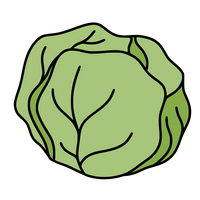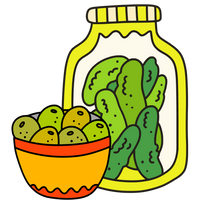
Pickles are a classic American snack. We all have nostalgia for our favorite childhood pickles. Were sweet gherkins your top snack at the July 4 picnic? How about that huge vinegary dill pickle that you bought from the big jar at the corner market deli?
Right now as you read this, 80% of refrigerators in this country have pickles in them!
Indeed most pickles are a staple condiment, topping or snack. We take dill pickles for granted because they've been with us so long and they're so familiar. But perhaps you are just starting to ask the questions... are pickles healthy? Not all pickles are created equal. Learn about different pickle types to understand which varieties offer the most probiotic benefits.
Are Pickles Healthy? It Depends.
If you've been hearing more lately about pickles, there's good reason. Pickled cucumbers and pickle juice have been trending over the past few years, landing on all the hot 'Top 10' lists for food trends lately.
Eating pickles and drinking the juice are definitely having a moment. Which is causing more of us to ask the question, are pickles even healthy? And the answer is, it depends.

At Olive My Pickle, we think of pickles as existing within three distinct categories:
The first category are pickles that have toxic substances such as artificial preservatives and sweeteners plus food dyes. You'd be surprised how many "favorite" brands, considered to be classic contain these. If you're not sure, go check the pickles in your fridge and if they list ingredients such as Polysorbate 80, high fructose corn syrup and Yellow 5, it's time to upgrade your pickles.
The second category are what we call "neutral" pickles because they have a neutral effect on your health. These are the perfectly fine vinegar pickles, usually made in smaller batches or according to a more craft method. These are enjoyable snacks and these salty foods are mighty tasty! But when you hear about how healthy pickles are for you, these vinegar pickled cucumbers are NOT the ones that are actively serving your heath.
The third and best category are SUPERFOOD pickles, which are salt water brine fermented. These are the 'original pickles' predating vinegar pickles by thousands of years. Salt water brine fermentation is how our ancestors preserved their food for millennia prior to refrigeration. Olives in the Mediterranean, sauerkraut and fermented vegetables in Europe, and kimchi in Asia are all examples of fermented foods that spanned continents and cultures.
How do you know if your pickles are healthy? Watch Now:
How does salt water brine fermentation create Super Pickles?
We've written a lot about this, and for a complete article about the process of fermentation and the resulting health benefits, check out The 7 Principal Health benefits of Fermented Foods.
The bottom line is that fermentation process creates helpful bacteria in the pickle batch that support gut health. You will not find these live cultures in vinegar pickles because the acidity of vinegar is too high for these good guy probiotics to live.
Lacto-fermented pickles and pickle juice however have even more benefits, beyond their probiotics, and some of them very surprising. In the health world, there is a name for foods that confer nutritional benefits beyond just macronutrients and micronutrients. Foods with these higher status benefits are called functional foods and they perform functions above and beyond regular, healthy foods.
"Functional Food" versus "Superfood"?
We admit to using 'Superfood' when describing some of our own products, but the truth is, this is more of a marketing term than an official, scientific one. The truth is that superfoods are actually functional foods with a snazzier name.
 What are the health benefits of pickles?
What are the health benefits of pickles?
Here's the top 5 reasons salt water brine pickles are a functional food:
1. ENHANCED NUTRIENTS
Fermentation creates new and enhanced nutrients through its metabolic process. Thiamin (B1) increases during fermentation and contributes to a healthy nervous system and cardiovascular system.
Riboflavin (B2) plays a significant role in the body's energy production, and niacin (B3) is known to lower and stabilize cholesterol levels. Folic acid is a B vitamin that increases during fermentation and helps your body produce and maintain new cells. It also helps prevent changes to DNA that may lead to cancer.

2. FERMENTATION PRE-DIGESTS FOOD WITH ENZYMES
Fermentation breaks down components into more elemental forms and making them easier to digest via their food enzymes.
Food enzymes are found in most raw foods and their presence in the mouth and stomach helps to kick-start the digestive process. Digestive enzymes by contrast are created by the pancreas and do not enter the picture until food comes down into the small intestine.
When we eat enzyme-rich raw foods like fermented kraut, dill pickles and kimchi, they help start the process of digestion in the mouth and stomach and reduce the burden on the body to produce digestive enzymes.
They also allow the nutrients in food to be more absorbable and therefore bioavailable to the body.
3. REMOVAL OF TOXINS
The fermentation process removes toxins and eliminates harmful bad bacteria. In addition, it has been shown to biodegrade the pesticide residue on vegetables. Kimchi is a fermented food with an abundance of scientific research proving this fact. (1) (2)

4. FIBER AND PREBIOTICS
Fermented vegetables, including pickles, sauerkraut, and kimchi, are high-fiber foods. The American Heart Association tells us that 50% of Americans don't meet the daily requirement for fiber intake. (3)
Recent science has shown the vital importance of adequate fiber intake--both the quality and quantity of the fiber matter-- when it comes to gut health benefits. (4)
Ferments help with fiber! Curious about the difference between soluble and insoluble fiber and starch resistant foods? Where exactly do prebiotics fit in? Read our article The Best Types of Fiber for gut Health to get all your questions answered.

5. TASTE
Is taste a health benefit? Arguably yes, since the pleasure of eating delicious food is good for the mind and soul as it increases the quality of life.
Many people consider their pickles and olives a treat. The fermentation process creates a unique and robust taste in fermented vegetables that is extremely pleasant and satisfying.
How does the taste of fermented pickles differ from vinegar?
We sample a lot of pickles to brand new customers each week at the farmer's market. Most people remark that they can't believe the taste is so flavorful and ask if we're sure there's no vinegar. What they're tasting is the acid.
Fermented pickles get their flavor from lactic acid, while vinegar ones are flavored from acetic acid. Fermented foods definitly deliver on flavor but tend to be a smoother pickles with a more nuanced taste, for example, you can more easily taste the fresh dill, spices such as mustard seeds and salt in a fermented pickle because it is not overpowered by acidity from vinegar.
We've seen many a baby take a bite and say, 'Mmmm, pickles good!"

Pro Tip
Many vitamins and macronutrients are more accessible for the body to absorb when accompanied by fat; this is what it means to be fat-soluble. The same applies when eating foods.
We recommend eating ferments with good, healthy Omega 3 fats, so the micronutrients found within them are more bioavailable and absorbable. (Side note, when you're shopping for a good supplement, make sure the capsule contains fat, so you can absorb the vitamins you're taking.)
Isn't it amazing? The ancient food preservation method of fermentation, born of necessity and survival, possessed many incredible health benefits!
The functional food properties of fermented pickles were an unknown by-product to our ancestors for millennia as they went about preserving their vegetables in saltwater so they could eat in wintertime. Incredible.
Continue your pickle awareness journey and learn the answers to the 7 Common Questions About Lacto-Fermentation.
Sources:
- (1)https://pubmed.ncbi.nlm.nih.gov/19199784/ (
- 2)https://pubmed.ncbi.nlm.nih.gov/20405842/
- (3)https://www.ucsfhealth.org/education/increasing-fiber-intake#:~:text=The%20American%20Heart%20Association%20Eating,about%20half%20the%20recommended%20amount.
- (4) https://www.ncbi.nlm.nih.gov/pmc/articles/PMC7146107/









